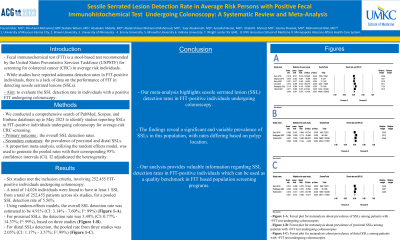Sunday Poster Session
Category: Colorectal Cancer Prevention
P0326 - Sessile Serrated Lesion Detection Rate in Individuals with Positive Fecal Immunohistochemical Test Undergoing Colonoscopy: A Systematic Review and Meta-Analysis
Sunday, October 22, 2023
3:30 PM - 7:00 PM PT
Location: Exhibit Hall


Fouad Jaber, MD
University of Missouri-Kansas City
Kansas City, MO
Presenting Author(s)
Award: Presidential Poster Award
Fouad Jaber, MD1, Mouhand Mohamed, MD2, Natalie Wilson, MD3, Abubaker Abdalla, MD4, Abdelrahman Mohamed Mahmoud, MS5, Saqr Alsakarneh, MD1, Azizullah Beran, MD6, Khalid K. Ahmed, MD7, Aasma Shaukat, MD8, Mohammad Bilal, MD9
1University of Missouri-Kansas City, Kansas City, MO; 2Brown University, Providence, RI; 3University of Minnesota, Minneapolis, MN; 4Emory University, Atlanta, GA; 5Menoufia University, Menoufia, Al Minufiyah, Egypt; 6Indiana University, Indianapolis, IN; 7The Wright Center for GME, Scranton, PA; 8NYU Langone Health, New York, NY; 9Minneapolis VA Medical Center, Minneapolis, MN
Introduction: Fecal immunochemical test (FIT) is a stool-based test recommended by the United States Preventative Services Taskforce (USPSTF) for screening for colorectal cancer (CRC) in average risk individuals. While studies have reported adenoma detection rates in FIT-positive individuals, there is a lack of data on the performance of FIT in detecting sessile serrated lesions (SSLs). We conducted a systematic review and meta-analysis to evaluate the SSL detection rate in individuals with a positive FIT undergoing colonoscopy.
Methods: We conducted a comprehensive search of PubMed, Scopus, and Embase databases up to May 2023 to identify studies reporting SSLs in FIT-positive individuals undergoing colonoscopy for average-risk CRC screening. The primary outcome was the overall SSL detection rate, and secondary outcomes included the prevalence of proximal and distal SSLs. A proportion meta-analysis, utilizing the random effects model, was used to generate the pooled rates with their corresponding 95% confidence intervals (CI). I2 adjudicated the heterogeneity. CMA software was used for statistical analysis.
Results: Six studies met the inclusion criteria, involving 252,455 FIT-positive individuals undergoing colonoscopy. Average age of patients ranged between 59-62 years, with 45.5% being female. Four of six studies were from North America (US and Canada). Two studies used a FIT positivity threshold of 20 mcg /g feces, while the remaining studies used a threshold of 10 mcg /g feces. A total of 14,026 individuals were found to have at least 1 SSL from a total of 252,455 patients across six studies, for a pooled SSL detection rate of 5.56%. Using random-effects models, the overall SSL detection rate was estimated to be 4.91% (CI: 3.14% - 7.60%; I²: 99%) (Figure 1-A). For proximal SSLs, the detection rate was 3.49% (CI: 0.77% - 14.37%; I²: 99%), based on three studies (Figure 1-B). For distal SSLs detection, the pooled rate from three studies was 2.05% (CI: 1.17% - 3.57%; I²: 99%) (Figure 1-C).
Discussion: Our meta-analysis highlights sessile serrated lesion (SSL) detection rates in FIT-positive individuals undergoing colonoscopy. The findings reveal a significant and variable prevalence of SSLs in this population, with rates differing based on polyp location. Our analysis provides valuable information regarding SSL detection rates in FIT-positive individuals which can be used as a quality benchmark in FIT based population screening programs.

Disclosures:
Fouad Jaber, MD1, Mouhand Mohamed, MD2, Natalie Wilson, MD3, Abubaker Abdalla, MD4, Abdelrahman Mohamed Mahmoud, MS5, Saqr Alsakarneh, MD1, Azizullah Beran, MD6, Khalid K. Ahmed, MD7, Aasma Shaukat, MD8, Mohammad Bilal, MD9. P0326 - Sessile Serrated Lesion Detection Rate in Individuals with Positive Fecal Immunohistochemical Test Undergoing Colonoscopy: A Systematic Review and Meta-Analysis, ACG 2023 Annual Scientific Meeting Abstracts. Vancouver, BC, Canada: American College of Gastroenterology.
Fouad Jaber, MD1, Mouhand Mohamed, MD2, Natalie Wilson, MD3, Abubaker Abdalla, MD4, Abdelrahman Mohamed Mahmoud, MS5, Saqr Alsakarneh, MD1, Azizullah Beran, MD6, Khalid K. Ahmed, MD7, Aasma Shaukat, MD8, Mohammad Bilal, MD9
1University of Missouri-Kansas City, Kansas City, MO; 2Brown University, Providence, RI; 3University of Minnesota, Minneapolis, MN; 4Emory University, Atlanta, GA; 5Menoufia University, Menoufia, Al Minufiyah, Egypt; 6Indiana University, Indianapolis, IN; 7The Wright Center for GME, Scranton, PA; 8NYU Langone Health, New York, NY; 9Minneapolis VA Medical Center, Minneapolis, MN
Introduction: Fecal immunochemical test (FIT) is a stool-based test recommended by the United States Preventative Services Taskforce (USPSTF) for screening for colorectal cancer (CRC) in average risk individuals. While studies have reported adenoma detection rates in FIT-positive individuals, there is a lack of data on the performance of FIT in detecting sessile serrated lesions (SSLs). We conducted a systematic review and meta-analysis to evaluate the SSL detection rate in individuals with a positive FIT undergoing colonoscopy.
Methods: We conducted a comprehensive search of PubMed, Scopus, and Embase databases up to May 2023 to identify studies reporting SSLs in FIT-positive individuals undergoing colonoscopy for average-risk CRC screening. The primary outcome was the overall SSL detection rate, and secondary outcomes included the prevalence of proximal and distal SSLs. A proportion meta-analysis, utilizing the random effects model, was used to generate the pooled rates with their corresponding 95% confidence intervals (CI). I2 adjudicated the heterogeneity. CMA software was used for statistical analysis.
Results: Six studies met the inclusion criteria, involving 252,455 FIT-positive individuals undergoing colonoscopy. Average age of patients ranged between 59-62 years, with 45.5% being female. Four of six studies were from North America (US and Canada). Two studies used a FIT positivity threshold of 20 mcg /g feces, while the remaining studies used a threshold of 10 mcg /g feces. A total of 14,026 individuals were found to have at least 1 SSL from a total of 252,455 patients across six studies, for a pooled SSL detection rate of 5.56%. Using random-effects models, the overall SSL detection rate was estimated to be 4.91% (CI: 3.14% - 7.60%; I²: 99%) (Figure 1-A). For proximal SSLs, the detection rate was 3.49% (CI: 0.77% - 14.37%; I²: 99%), based on three studies (Figure 1-B). For distal SSLs detection, the pooled rate from three studies was 2.05% (CI: 1.17% - 3.57%; I²: 99%) (Figure 1-C).
Discussion: Our meta-analysis highlights sessile serrated lesion (SSL) detection rates in FIT-positive individuals undergoing colonoscopy. The findings reveal a significant and variable prevalence of SSLs in this population, with rates differing based on polyp location. Our analysis provides valuable information regarding SSL detection rates in FIT-positive individuals which can be used as a quality benchmark in FIT based population screening programs.

Figure: Figure 1-A: Forest plot for metanalysis about prevalence of SSLs among patients with +FIT test undergoing colonoscopies
Figure 1-B: Forest plot for metanalysis about prevalence of proximal SSLs among patients with +FIT test undergoing colonoscopies
Figure 1-C: Forest plot for metanalysis about prevalence of distal SSLs among patients with +FIT test undergoing colonoscopies
Figure 1-B: Forest plot for metanalysis about prevalence of proximal SSLs among patients with +FIT test undergoing colonoscopies
Figure 1-C: Forest plot for metanalysis about prevalence of distal SSLs among patients with +FIT test undergoing colonoscopies
Disclosures:
Fouad Jaber indicated no relevant financial relationships.
Mouhand Mohamed indicated no relevant financial relationships.
Natalie Wilson indicated no relevant financial relationships.
Abubaker Abdalla indicated no relevant financial relationships.
Abdelrahman Mohamed Mahmoud indicated no relevant financial relationships.
Saqr Alsakarneh indicated no relevant financial relationships.
Azizullah Beran indicated no relevant financial relationships.
Khalid Ahmed indicated no relevant financial relationships.
Aasma Shaukat indicated no relevant financial relationships.
Mohammad Bilal: Boston Scientific – Consultant.
Fouad Jaber, MD1, Mouhand Mohamed, MD2, Natalie Wilson, MD3, Abubaker Abdalla, MD4, Abdelrahman Mohamed Mahmoud, MS5, Saqr Alsakarneh, MD1, Azizullah Beran, MD6, Khalid K. Ahmed, MD7, Aasma Shaukat, MD8, Mohammad Bilal, MD9. P0326 - Sessile Serrated Lesion Detection Rate in Individuals with Positive Fecal Immunohistochemical Test Undergoing Colonoscopy: A Systematic Review and Meta-Analysis, ACG 2023 Annual Scientific Meeting Abstracts. Vancouver, BC, Canada: American College of Gastroenterology.

